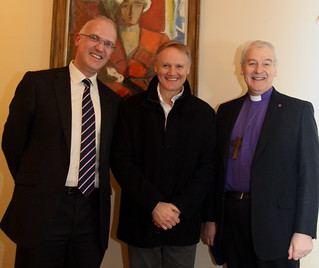News
Joe Schmidt at CITI

The successful rugby coach and former teacher was invited along to address ordinands, staff, friends and neighbours of CITI on the subject of leadership. He had the packed Hartin Room entranced as he shared his wisdom and generously gave his time to answer numerous questions from the audience.
Welcoming Joe and the large attendance, the Director of CITI, the Revd Canon Dr Maurice Elliott, explained that he was used to welcoming a wide range of guests to the Institute but they were normally from ecclesiastical or academic backgrounds.
Outlining the qualities of good leadership, Joe Schmidt said that leadership is a lifelong learning process. “You don’t suddenly learn how to lead or identify leaders,” he stated. “In the time that I’ve been involved I’ve been incredibly lucky. People say I’ve led teams to trophies. But the reality is that teams have led themselves. If the leadership comes from the team then all they need is guidance.”
A key element of leadership is investing in people, he said. He explained that earlier in the day he had named a 35–member quad but they had also spent a lot of time listing the qualities of the other professional players and identifying their strong points and what they needed to work on in order to keep their faith in playing international rugby.
“The more investment in the team, the stronger the leadership is within the team and the easier it is to lead because the team will inevitably adopt some of the traits you portray. It’s very much ‘do as I do’. You can’t say one thing and then do another,” he explained stating that this was equally true of his career in education.
Joe said he had never set himself a goal of getting anywhere explaining that it is not a matter of going anywhere but of working hard and investing in the people you have. “If they see you using them as a springboard to get somewhere, you won’t go anywhere,” he said.
In answer to a question on how he communicates his vision to the team, Joe said it is the players who have the vision and he works on identifying their strengths and how they can be worked into the game. He also said that when they are looking for players, they seek to get the right person and then build on the player – obviously given that the person can play rugby.
Photographs: Lyn Glanville

